Our research
Uterine fibroids
Uterine fibroids, also known as leiomyomas, are extremely common non-malignant tumours that arise from the smooth muscle layer of the uterus. Despite their benign nature, they can cause a variety of symptoms including excessive bleeding and abdominal pain, and negatively affect fertility and pregnancy. Their impact on women’s well-being is thus significant.
Work from our research group has revealed that there are at least four distinct subclasses of uterine fibroids, with characteristic genetic driver mutations. The subclasses show unique gene expression patterns and have been associated with distinct clinical and pathological characteristics.
In a recent study, based on fibroid patient samples collected in collaboration with clinicians at Danderyds Sjukhus and hospitals in Finland, we could for the first time demonstrate the clinical relevance of the fibroid subclasses. By retrospectively comparing tumour shrinkage in response to the volume-reducing drug ulipristal acetate (UPA), we found that treatment sensitivity was influenced by the molecular subclass. We are now further exploring how subclass specific features could potentially be used to predict treatment response and personalize treatment. To do this, we are setting up a tissue slice culture system in which thin sections of surgically removed uterine fibroids are cultured on membrane inserts. We are also evaluating the possibility of using liquid biopsies for pre-treatment subclassification.
Our uterine fibroid studies are performed in collaboration with clinicians at Karolinska University Hospital, Huddinge and Danderyd Hospital.
Colorectal cancer

Colorectal cancer is our long-term interest, and the group has contributed to several key discoveries along the way. Although a number of genetic variations (mutations) have been linked to colorectal cancer, we still do not know the full set of mutations that are necessary, and together sufficient, to cause this type of cancer. One of the aims with our research, is to identify novel mutations/genetic aberrations that contribute to colorectal cancer and to explore how these contribute to tumourigenesis.
In a high-throughput effort to characterize structural genetic changes in a large number of human colorectal cancer samples (Palin et al. Nature Communications 2018), a set of plausible candidate targets were identified. We are currently functionally validating one of the most striking findings, to see if and how the putative driver gene contributes to colorectal cancer.
Lauri Aaltonen is a principal researcher (Cancer Genetics) at KI. His main position is at the University of Helsinki, where he is the Director of the Center of Excellence in Tumor Genetics Research.
